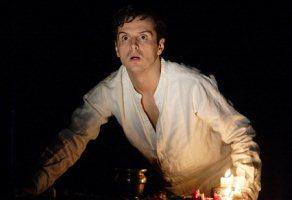Emperor and Galilean
'Emperor and Galilean' was written by Henrik Ibsen. It is one of that famous playwright's lesser known works and this is the first English version produced. That alone provides some incentive to see it as the opportunity may not come along again anytime in the foreseeable future. But, at three and a half hours long, some may find it challenging.
Essentially, 'Emperor and Galilean' is about a time of transition in the Roman Empire. The Emperor Constantius is Christian and has secured his position by butchering the family of his nephew, Julian. The Emperor keeps Julian almost under house arrest, but finally let's him go to Athens to study. Already doubting his Christianity, Julian is gradually attracted to paganism abetted by a mystic called Maximus who conjures-up spirits to deliver cryptic messages to Julian. Later, Julian is made Caesar of the western empire, but when his wife is poisoned, his troops persuade him to challenge the Emperor for supremacy. But Constantius dies before they can face each other in battle and Julian becomes Emperor, subsequently brushing aside Christianity and reverting to paganism.
Jonathan Kent's production is on an epic scale. A cast of 50 or so provide the soldiers, courtiers and priests who form the backdrop to the main action. Scenes change rapidly thanks to the use of the Olivier's drum revolve which delivers sets to the stage in a trice. Video projections add both movement and modern references in the form of fighter jets.
On stage for almost the entire performance, Andrew Scott bravely takes on the exhausting leading role. His Julian is a troubled man who, initially at least, lives only at the whim of his paranoid Emperor uncle. Even when we first meet him, Julian tells us that "God has left me" and he is subjected to dreams and "ideas creeping through the windows". Andrew Scott ably defines a man who is tortured by philosophical questions and has to finally make a choice between being Emperor or Galilean. He's ably supported by the large cast, and particularly Nabil Shaban as the sinister Constantius, and Ian McDiarmid as the mysterious and influential mystic, Maximus.
Ben Power is the person responsible for adapting Ibsen's monumental work. Even having reduced it to something like a third of the original, some members of the audience felt unable to cope with the second half. That's not particularly surprising, but I didn't find that the play dragged or became tedious. The first half of almost 2 hours passes briskly and, since the second half is shorter, the balance seems to make it manageable. But it won't suit everyone, I'm sure, because there is a lot to take in, and much of it is focused on rather wordy philosophical discussions.
Ibsen's original took about a decade to write. His longest play and what he regarded as his 'major work', it was finally completed in 1873. Apparently, 'Emperor and Galilean' was one of Hitler's favourite plays which may not be exactly the best recommendation. But it is a work by a very important playwright, even if it is not his best play. It also covers an important period of history which doesn't always get the attention and prominence it deserves. And Jonathan Kent's impressive production endeavours to turn a rather dry play into something accessible and interesting, and in many respects succeeds. All good reasons to take a chance and give it a try.
"Oh Lord, please make it stop, I heard myself muttering during the long and punishing course of Ibsen's Emperor and Galilean...despite everything the director Jonathan Kent can throw at it in the way of lavish designs and an epic cast, the piece proves an almost unendurable bore."
Charles Spencer for The Daily Telegraph
"Even though Ibsen's Faustian world-historical play may be several degrees short of a masterpiece, it is still an experience I wouldn't have missed."
Michael Billington for The Guardian
"Ben Power's modern adaptation of this epic drama is a strident distillation, triumphantly directed by Jonathan Kent."
Patrick Marmion for The Daily Mail
"There is plenty more to admire in this production...Fans of Ibsen hardly need telling that they should see this epic drama...But it's not easy to recommend this exacting spectacle to a wider audience."
Henry Hitchings for The Evening Standard
"I am glad to have seen this play, but rather less glad to have spent three and a half hours seeing it."
Ian Shuttleworth for The Financial Times
External links to full reviews from popular press
The Guardian - The Guardian -
Originally published on
